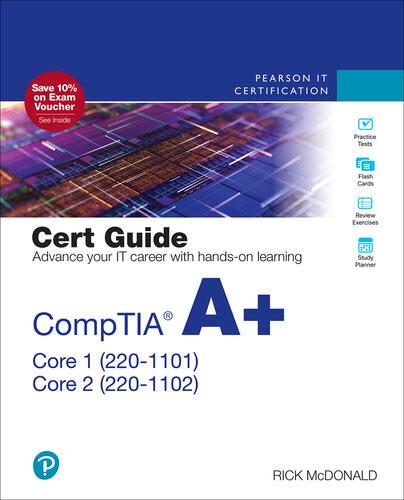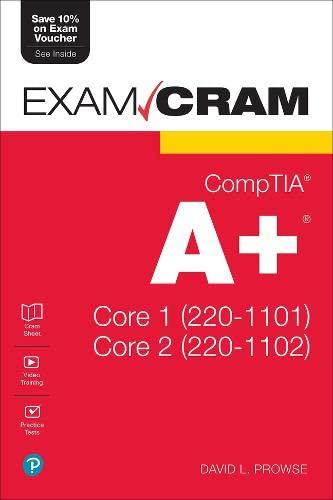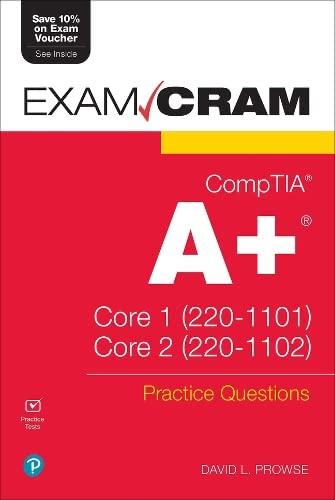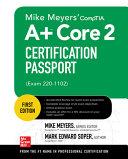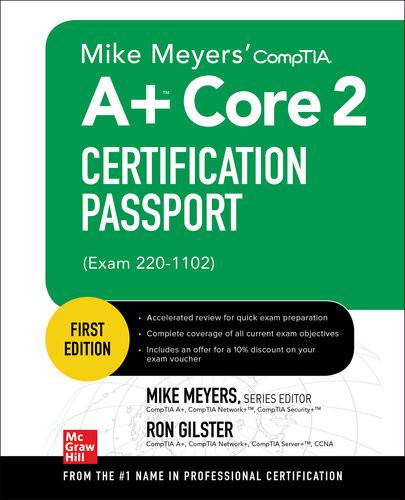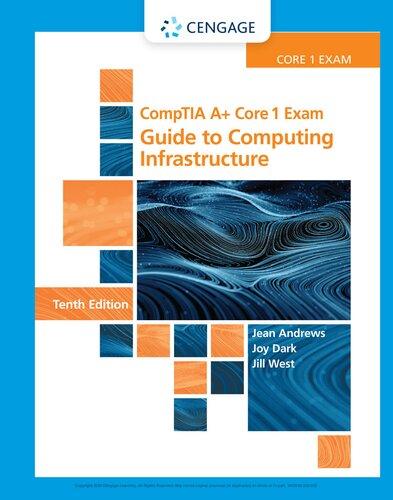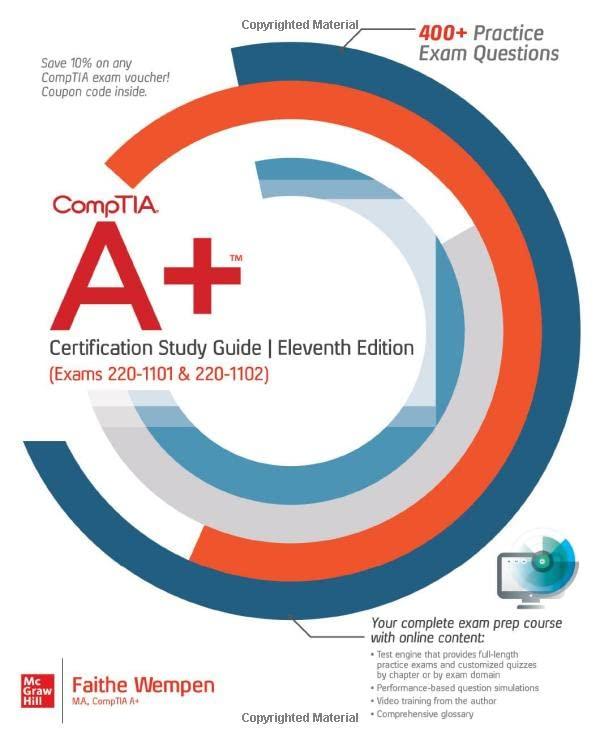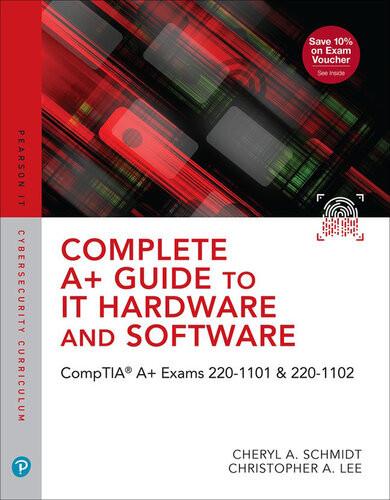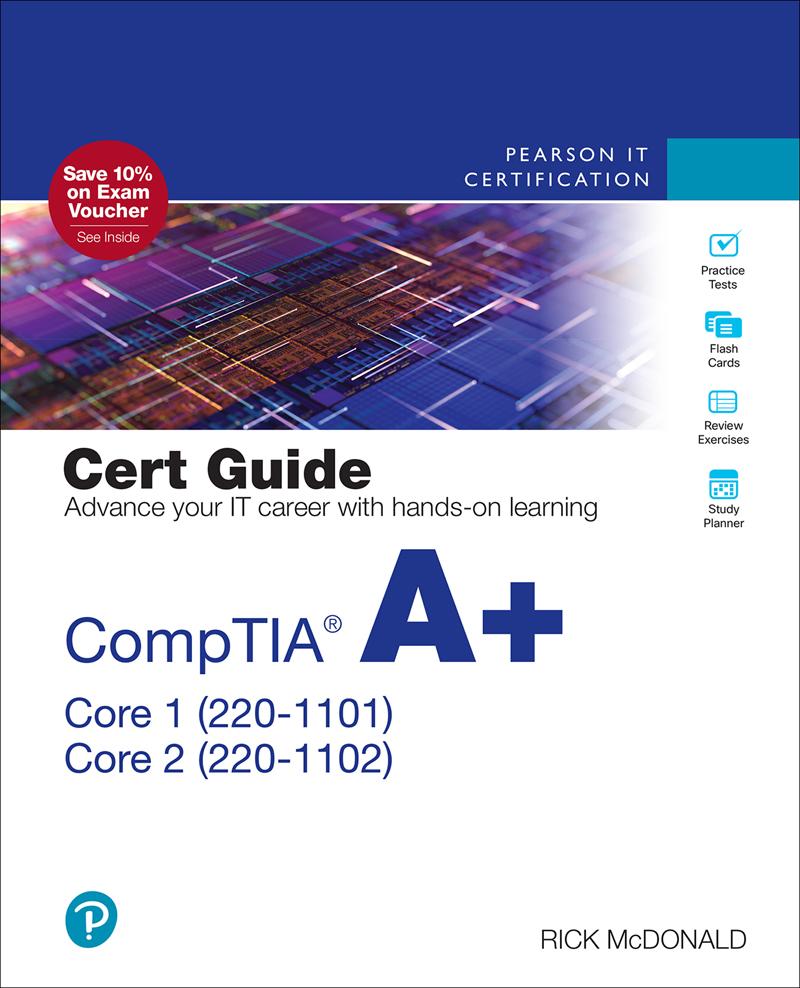About This eBook
ePUB is an open, industry-standard format for eBooks. However, support of ePUB and its many features varies across reading devices and applications. Use your device or app settings to customize the presentation to your liking. Settings that you can customize often include font, font size, single or double column, landscape or portrait mode, and figures that you can click or tap to enlarge. For additional information about the settings and features on your reading device or app, visit the device manufacturer’s Web site.
Many titles include programming code or configuration examples. To optimize the presentation of these elements, view the eBook in single-column, landscape mode and adjust the font size to the smallest setting. In addition to presenting code and configurations in the reflowable text format, we have included images of the code that mimic the presentation found in the print book; therefore, where the reflowable format may compromise the presentation of the code listing, you will see a “Click here to view code image” link. Click the link to view the print-fidelity code image. To return to the previous page viewed, click the Back button on your device or app.
CompTIA® A+ Core 1 (220-1101) and Core 2 (220-1102) Cert Guide
Copyright © 2023 by Pearson Education, Inc.
All rights reserved. No part of this book shall be reproduced, stored in a retrieval system, or transmitted by any means, electronic, mechanical, photocopying, recording, or otherwise, without written permission from the publisher. No patent liability is assumed with respect to the use of the information contained herein. Although every precaution has been taken in the preparation of this book, the publisher and author assume no responsibility for errors or omissions. Nor is any liability assumed for damages resulting from the use of the information contained herein.
ISBN-13: 978-0-13-767594-4
ISBN-10: 0-13-767594-1
Library of Congress Control Number: 2022941819
ScoutAutomatedPrintCode
Trademarks
All terms mentioned in this book that are known to be trademarks or service marks have been appropriately capitalized. Pearson IT Certification cannot attest to the accuracy of this information. Use of a term in this book should not be regarded as affecting the validity of any trademark or service mark.
Microsoft and/or its respective suppliers make no representations about the suitability of the information contained in the documents and related graphics published as part of the services for any purpose. All such documents and related graphics are provided “as is” without warranty of any kind. Microsoft and/or its respective suppliers hereby disclaim all warranties and conditions with regard to this information, including all warranties and conditions of merchantability, whether express, implied or statutory, fitness for a particular purpose, title and non-infringement. In no event shall Microsoft and/or its respective suppliers be liable for any special, indirect or consequential damages or any damages whatsoever resulting from loss of use, data or profits, whether in an action of contract, negligence or other tortious action, arising out of or in connection with the use or performance of information available from the services.
The documents and related graphics contained herein could include technical inaccuracies or typographical errors. Changes are periodically added to the information herein. Microsoft and/or its respective suppliers may make improvements and/or changes in the product(s) and/or the program(s) described herein at any time. Partial screenshots may be viewed in full within the software version specified.
Microsoft® and Windows® are registered trademarks of the Microsoft Corporation in the U.S.A. and other countries. Screenshots and icons reprinted with permission from the Microsoft Corporation. This book is not sponsored or endorsed by or affiliated with the Microsoft Corporation.
Editor-in-Chief
Mark Taub
Executive Editor
Nancy Davis
Development Editor
Christopher A. Cleveland
Managing Editor
Sandra Schroeder
Senior Project Editor
Tonya Simpson
Copy Editor
Krista Hansing
Indexer
Ken Johnson
Proofreader
Jen Hinchliffe
Technical Editor
Chris Crayton
Publishing Coordinator
Cindy Teeters
Cover Designer
Chuti Prasertsith
Compositor codeMantra
Warning and Disclaimer
Every effort has been made to make this book as complete and as accurate as possible, but no warranty or fitness is implied. The information provided is on an “as is” basis. The author and the publisher shall have neither liability nor responsibility to any person or entity with respect to any loss or damages arising from the information contained in this book.
Special Sales
For information about buying this title in bulk quantities, or for special sales opportunities (which may include electronic versions; custom cover designs; and content particular to your business, training goals, marketing focus, or branding interests), please contact our corporate sales department at corpsales@pearsoned.com or (800) 382-3419.
For government sales inquiries, please contact governmentsales@pearsoned.com.
For questions about sales outside the U.S., please contact intlcs@pearson.com.
Contents at a Glance
Introduction
Part I: Core 1
CHAPTER 1 Mobile Devices
CHAPTER 2 Networking
CHAPTER 3 Hardware
CHAPTER 4 Virtualization and Cloud Computing
CHAPTER 5 Hardware and Network Troubleshooting
Part II: Core 2
CHAPTER 6 Operating Systems
CHAPTER 7 Security
CHAPTER 8 Software Troubleshooting
CHAPTER 9 Operational Procedures
Part III: Final Preparation
CHAPTER 10 Final Preparation
APPENDIX A Answers to the “Do I Know This Already?” Quizzes and Review Questions
APPENDIX B CompTIAA+Core1(220-1101)andCore2 (220-1102)CertGuideExam Updates
Glossary Index
Online Only Elements
APPENDIX C Memory Tables
APPENDIX D Memory Tables Answer Key
APPENDIX E Study Planner
Glossary
Table of Contents
Introduction
Part I: Core 1
Chapter 1 Mobile Devices
“Do I Know This Already?” Quiz
Foundation Topics
Installing and Configuring Laptop Hardware and Components
Laptop Access
Keyboard
Hard Drive Storage
HDD/SSD Migration
Memory
Mini PCIe
Wireless Card
USB Travel Routers and Wireless WAN Cards
Battery
Physical Privacy and Security Components
Biometrics
Near-fieldScannerFeatures
Display Components of Mobile Devices
Display Components
Screens
LCD OLED
Wi-Fi Antenna Connector/Placement
Webcam
Microphone
Inverter
Touchscreen/Digitizer
Setting Up and Configuring Accessories and Ports of Mobile Devices
Connection Methods: Wired
Micro-USB/Mini-USBforAndroidandWindows
USB-C
LightningforAppleiOS
Hotspot
SerialInterfaces
ProprietaryVendor-SpecificPorts (Communication/Power)
Connection Types: Wireless
NFC
Bluetooth
Hotspot
Accessories
Headsets
Speakers
TouchPens
Webcam
Trackpad/DrawingPad
Docking Station
Port Replicator
Configuring Basic Mobile Device Network Connectivity and Application Support
Wireless/Cellular Data Network Connectivity for Mobile Devices
EnablingandDisabling2G/3G/4G(LTE)/5G
Enabling/DisablingHotspots
Enabling/DisablingTethering
GSMvs.CDMA
PRLUpdates/BasebandUpdates
Bluetooth
StepstoConfigureaBluetoothHeadsetonanAndroidBasedDevice
StepstoConfigureaBluetoothHeadsetonaniOS Device
GPS and Cellular Location Services
Mobile Device Management (MDM)
Mobile Application Management (MAM)
Mobile Device Synchronization
TypesofDatatoSynchronize
SynchronizationMethods
CommercialMailSynchronization
Exam Preparation Tasks
Review All the Key Topics
Complete the Tables and Lists from Memory
Define Key Terms
Chapter 2 Networking
“Do I Know This Already?” Quiz
Foundation Topics
TCP and UDP Ports, Protocols, and Their Purposes
FTP
SMTP
DNS DHCP
HTTP/HTTPS POP3
SMB/CIFS
RDP
TCP vs. UDP
Networking Hardware
Router
Switch
Wireless Access Point
Patch Panel
Firewall
Power over Ethernet
Hub
Modems: Cable and DSL
Optical Network Terminal (ONT)
Network Interface Card
Software-Defined Networking
Compare and Contrast Wireless Networking Protocols
Frequencies
MIMO
Channels
Bluetooth
Wi-Fi Standards
Long-Range Fixed Wireless
NFC
RFID
Services Provided by Networked Hosts
DNS Server
DHCP Server
File Server
Print Server
Mail Server
Syslog Server
Web Server
Authentication, Authorization, and Accounting (AAA)
Server
Internet Appliances
SpamGateways
UTM
IDS
IPS
LoadBalancers
ProxyServer
Legacy and Embedded Systems
Internet of Things (IoT) Devices
Install and Configure a Basic Wired/Wireless SOHO Network
IP Addressing
IPv4
PublicandPrivateIPAddresses
IPv6
ViewingIPAddressInformation
APIPAIPAddresses/LinkLocalAddresses
Dynamicvs.StaticIPAddresses
DHCP
IP Addressing
NIC Configuration
NICConfigurationSteps
End-User Device Configuration
Cable/DSL Modem
Network Configuration Concepts
DNS
DHCP
VLAN
VPN
Internet Connection Types, Network Types, and Their Features
Internet Connection Types
Cable
DSL
Fiber
Satellite
Cellular
WirelessInternetServiceProvider
Network Types
Using Networking Tools
Cutting Tool
Cable Stripper
Crimper
Punchdown Tool
Multimeter
Toner Probe
Cable Tester
Loopback Plug
Wi-Fi Analyzer
Network Tap
Exam Preparation Tasks
Review All the Key Topics
Complete the Tables and Lists from Memory
Define Key Terms
Chapter 3 Hardware
“Do I Know This Already?” Quiz
Foundation Topics
Basic Cable Types
Network Cables
Ethernet
Fiber
Coaxial
Video Cables
VGA
HDMI
DisplayPort
DVI
Peripheral Cables
Thunderbolt
USB
Peripheral Cables: Serial
Hard Drive Cables
SATACables
IDECable
SCSI
Adapters
DVItoHDMI
USBtoEthernet
DVI-ItoVGA
Connector Types
Installing RAM Types
Virtual RAM
SODIMM Memory
DDR3 SDRAM
DDR4 SDRAM
DDR5 SDRAM: The Current Standard
Single Channel
Dual Channel
Triple Channel
Quad Channel
Parity vs. Nonparity
ErrorCorrection:ECCvs.non-ECCMemory
Installing Memory
PreparationsforInstallingDIMMMemory
Installing Storage Devices
Optical Drives
CD-ROM/CD-RW
DVDRecordableandRewritableStandards
Blu-rayDisc(BD)
DriveSpeedRatings
RecordingFilestoOpticalDiscs
Hard Drives
Solid-StateDrive(SSD)
Magnetic Hard Disk Drives
Speeds/SpinRate
FormFactors
Hybrid Drives
Flash Drives/Memory Cards
FlashCardReader
Storage Device Configurations
RAIDTypes
CreatingaSATARAIDArray
Hot-SwappableDrives
Installing Motherboards, CPUs, and Add-on Cards
Motherboard Form Factors
ATXandmATX
ITXFamily
ComparingATX,microATX,andMini-ITXMotherboards
Motherboard Connector Types
PeripheralComponentInterconnect(PCI)Slots
PCIe(PCIExpress)Slots
PowerConnectors
SATA
eSATA
Headers
M.2
Motherboard Compatibility
ProcessorCompatibility
CentralProcessingUnit(CPU)SocketTypes
Servers
Mobile
Basic Input/Output System (BIOS)/Unified Extensible
Firmware Interface (UEFI) Settings
BIOS/UEFIConfiguration
AccessingtheBIOS/UEFISetupProgram
UEFIandTraditionalBIOS
BIOS/UEFISettingsOverview
BootOptions:SettingsandBootSequence
FirmwareUpdates
SecurityFeatures
InterfaceConfigurations
CMOSBattery
Encryption
TrustedPlatformModule(TPM)
HardwareSecurityModule(HSM)
CPU Architecture
x64/x86
AdvancedRISCMachine(ARM)
CPU Cores: Single Core and Multicore
Multithreading
Virtualization Support
CPU Speeds
Expansion Cards
InstallingSoundCards
ExternalUSBAudioSoundCards
InstallingVideoCards
IntegratedGraphicsProcessingUnit(GPU)
VideoCaptureCards
InstallingNetworkCards
Cooling Mechanisms
Fans
Fanless/PassiveHeatSinks
HeatSink
Phase-ChangeMaterial/ThermalPaste
Liquid-BasedCooling
Power Supplies
Power Supply Ratings
Input 115V vs. 220V Multivoltage Power Supplies
20-Pin-to-24-Pin Motherboard Adapter
Output 3.3V vs. 5V vs. 12V
Redundant Power Supply
Modular Power Supply
Multifunction Devices/Printers and Settings
Unboxing a Device/Setup Location Considerations
Appropriate Drivers for the Office Environment
Configuration Settings
Public/Shared Devices
IntegratedEthernetPrint/MultifunctionDeviceSharing
WirelessDeviceSharingOptions
Using Public and Shared Devices
UsingApps
MaintainingDataPrivacy
Network Scan Services
ScanningtoEmail
ScanningtoanSMBFolder
CloudandRemotePrinting
AutomaticDocumentFeeder/FlatbedScanner
Print Technologies
Laser Printers
TonerCartridges
LaserImagingProcess
ColorLaserPrintingDifferences
LaserMediaTypes
LaserMaintenance
Inkjet Printers
InkjetComponents
InkjetPrintingProcess
InkjetMediaTypes
InkjetMaintenance
Thermal Printers
ThermalFeedAssemblyandHeatingElement
ThermalPrinterRibbons
ThermalPrintProcess
ThermalPaperandMedia
ThermalMaintenance
Impact Printers
ImpactComponentsandPrintProcess
ImpactPrintHeads
ImpactPrinterRibbons
ImpactPrinterPaperTypes
ImpactPrinterMaintenance
3D Printers
Maintaining3DPrinters
Exam Preparation Tasks
Review All the Key Topics
Complete the Tables and Lists from Memory
Define Key Terms
Chapter 4 Virtualization and Cloud Computing
“Do I Know This Already?” Quiz
Foundation Topics
Common Cloud Models
IaaS
SaaS
PaaS
Public vs. Private vs. Hybrid vs. Community
Cloud Characteristics
SharedResources
RapidElasticity
HighAvailability
FileSynchronization
On-Demand
MeteredUtilization
Desktop Virtualization
Client-Side Virtualization Overview
Host/Guest Virtualization
Purpose of Virtual Machines
Resource Requirements
Security Requirements
Exam Preparation Tasks
Review All the Key Topics
Define Key Terms
Chapter 5 Hardware and Network Troubleshooting
“Do I Know This Already?” Quiz
Foundation Topics
Troubleshooting Methodology
Troubleshooting Motherboard, RAM, CPU, and Power
Issues
POST Code Beeps
POSTErrorMessages
Proprietary Crash Screens (BSOD/Pinwheel)
BSODErrors
macOSPinwheel
Black Screen No Power
Overheating
Overloading
FanFailure
InadequateAirflowOutsidetheSystem
InadequateAirflowInsidetheSystem
DirtandDust
Installing/ReplacingCaseFans
No Power
Sluggish Performance
Overheating
Burning Smells
PowerSupplyTester
Step-by-StepPowerSupplyTroubleshooting
Intermittent Shutdown
Application Crashes
LogEntriesandErrorMessages
Grinding Noise
Capacitor Swelling
Inaccurate System Date/Time
Troubleshooting Storage Drives and RAID Arrays
Light-Emitting Diode (LED) Status Indicators
Read/Write Failure
Slow Performance
Grinding and Clicking Noises
Failure to Boot
Bootable Device Not Found
Data Loss/Corruption
RAID Failure
S.M.A.R.T. Failure
Extended Read/Write Times
Input/Output Operations per Second (IOPS)
Missing Drives in OS
Troubleshooting Video, Projector, and Display Issues
Incorrect Data Source
Physical Cabling Issues
Burned-Out Bulb
Intermittent Projector Shutdown
Dead Pixels
Incorrect Color Display
Dim Image
Flashing Screen
Fuzzy or Distorted Image
Display Burn-in
LCDDisplays
PlasmaDisplays
Audio Issues
Mobile Device Troubleshooting
Poor Battery Health and Improper Charging
Swollen Battery
Broken Screen
Poor/No Connectivity
Liquid Damage
Overheating
Digitizer Issues
Nonresponsive Touchscreen
Physically Damaged Ports
Malware
Cursor Drift/Touch Calibration
Printer Troubleshooting
Lines Down the Printed Pages
LaserPrinter
InkjetPrinter
ThermalPrinters
ImpactPrinters
Faded Prints
LaserPrinters
InkjetPrinters
ThermalPrinters
ImpactPrinters
Double/Echo Images on the Print
Toner Not Fusing to the Paper
Incorrect Paper Size
Paper Not Feeding
Paper Jams
PaperPathIssues
PaperLoading,PaperType,andMediaThickness Issues
MediaCaughtInsidethePrinter
Multipage Misfeed
Garbled Print
Vertical Lines on Page
Multiple Prints Pending in a Queue
ReleasingaPrintQueue
ClearingSelectPrintJobsorAllPrintJobsinaQueue
Speckling on Printed Pages
Incorrect Chroma Display
Grinding Noise
Finishing Issues
Incorrect Page Orientation
Print Logs
Network Troubleshooting
No Connectivity
External Interference and Intermittent Wireless
Connectivity
Slow Network Speeds
Limited Connectivity
Latency and Jitter
Poor Voice over Internet Protocol (VoIP) Quality
Port Flapping
Exam Preparation Tasks
Review All the Key Topics
Complete the Tables and Lists from Memory
Define Key Terms
Part II: Core 2
Chapter 6 Operating Systems
“Do I Know This Already?” Quiz
Foundation Topics
Basic Features of Microsoft Windows Editions
Windows 10 Editions
Feature Differences
DomainAccessvs.Workgroup
DesktopStyles/UserInterface
RemoteDesktopConnectionandRemoteAssistance
RandomAccessMemory(RAM)
BitLocker
